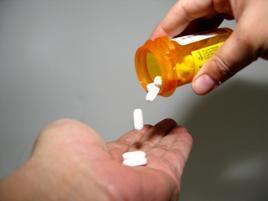Former N.J. Pharmacist Arrested on Charges of Illegally Distributing Oxycodone, Other Opioids

A 62-year-old former pharmacist was arrested May 12 on charges that she illegally dispensed huge quantities of oxycodone and other controlled substances to customers and drug dealers for more than three years from a Trenton, New Jersey, pharmacy (United States v. Ndubizu, Crim. No. 22-234 (ZNQ) (D.N.J.)).
Florence Ndubizu, formerly the co-owner and pharmacist-in-charge of Healthcare Pharmacy, was charged with one count of conspiracy to unlawfully distribute and dispense and to possess with intent to distribute Schedule II controlled substances, including oxycodone; one count of unlawfully distributing and dispensing a controlled substance; and one count of maintaining a premises for the illegal distribution of a controlled substance.
Grand Jury Indictment
“From at least as early as 2014 and continuing to on or about Aug. 31, 2017,” according to a 34-page grand jury indictment filed in the U.S. District Court for the District of New Jersey, Ndubizu “operated her pharmacy as a criminal enterprise, unlawfully distributing and dispensing tens of thousands of doses of oxycodone and other Schedule II controlled substances for profit.”
The indictment, filed March 31, was unsealed May 12.
Ndubizu and employee coconspirators who acted at her direction “filled fraudulent prescriptions outside the usual course of professional practice, knowing that the drugs would not be used for a legitimate medical purpose, but instead would be illegally diverted, included to street-level drug dealers,” the indictment alleged.
According to the DEA and the Department of Justice (DOJ), Ndubizu “purchased and distributed millions of dosage units of oxycodone, including over 800,000 pills in 2014, over 900,000 pills in 2015, over 800,000 pills in 2016, and over 200,000 pills in 2017, until the DEA suspended the pharmacy’s registration.” The statistics were obtained from the DEA’s Automation of Reports and Consolidated Orders System (ARCOS).
During each of those years, Healthcare Pharmacy “was one of the largest purchasers of oxycodone in the state of New Jersey,” the agencies alleged.
In August 2017, the DEA served an immediate suspension of registration order on the pharmacy, Ndubizu surrendered the pharmacy’s registration five weeks later.
Change in Distributors
As part of a conspiracy with pharmacy employees and drug dealers, the government alleged, Ndubizu purchased large quantities of controlled substances from distributors to satisfy the demands of pharmacy customers, whom she knew to be fraudulently obtaining or forging prescriptions. She allegedly knew that customers’ purported prescriptions were not issued in the usual course of professional treatment and were not issued for a legitimate medical purpose.
In August 2016, one of the pharmacy’s distributors suspended all sales of controlled substances to the pharmacy, the indictment reported. The distributor cited a number of red flags of diversion in the pharmacy’s practices, including:
- the high percentage of oxycodone orders when compared with the pharmacy’s total orders of controlled substances;
- the high percentage of the pharmacy’s patients receiving only oxycodone from the pharmacy;
- the large number of patients paying primarily in cash, and the large number of patients receiving combinations of oxycodone 30 mg and methadone 10 mg in large quantities;
- examples of physician shopping among patients receiving controlled substances from the pharmacy;
- the filling of duplicate and/or nonclinical combinations of prescriptions; and
- the filling of prescriptions for patients with excessive quantities of controlled substances prescribed.
The distributor continued to supply noncontrolled substances to the pharmacy. However, within nine weeks, Ndubizu closed the pharmacy’s account with the distributor, and a week later she opened a new primary vendor account with another distributor and resumed ordering large quantities of oxycodone products and other Schedule II controlled substances.
Alleged Filling of Invalid, Fraudulent Prescriptions
The government also alleged that Ndubizu “filled facially invalid and fraudulent prescriptions at [the pharmacy] for profit.” For example, according to the indictment, she and the pharmacy:
- filled prescriptions marked as “VOID,” indicating that the purported prescriptions had been photocopied;
- filled prescriptions that did not identify the name of the patient;
- filled prescriptions purportedly from the same physician that bore different physician signatures;
- filled prescriptions that lacked the appropriate watermarks or other indicia that they had been written on a legitimate prescription pad; and
- filled prescriptions on which the customer had altered the prescription by increasing the number of dosage units called for (including cases in which customers had altered prescriptions while in the pharmacy and Ndubizu had been immediately notified about the alterations but ordered the prescriptions to be filled).
“Ndubizu failed to report any of these fraudulent prescriptions to DEA, and instead filled them for profit,” the indictment alleged.
In addition, Ndubizu allegedly dispensed Schedule II controlled substances without conducting patient drug utilization reviews or consulting a patient’s records in the state’s Prescription Monitoring Program database. Approximately 100 of the customers allegedly averaged more than 200 morphine milligram equivalent doses (MME) of opiates per day, and “multiple” customers received more than 1,000 MME per day.
She also allegedly filled more than 1,000 prescriptions for the dangerous “trinity” combination of an opioid, benzodiazepine and a muscle relaxant, which can put patients at greater risk for potentially fatal overdoses.
Also, according to the indictment, Ndubizu filled more than 10,000 prescriptions from customers who had submitted prescriptions from different doctors for the same drug. More than 30 customers submitted prescriptions for oxycodone and other substances from three or more different physicians — an indication of doctor shopping.
Hundreds of prescriptions also allegedly were filled for out-of-state customers, including “many regular customers traveling from the New York City area and others traveling over 100 miles from other areas of New York state.”
Other Alleged Parts of the Conspiracy
Ndubizu also allegedly:
- filled numerous fraudulent prescriptions over several years without calling the prescribing physicians to determine whether the prescriptions were legitimate;
- continued to fill prescriptions for customers who had submitted fraudulent prescriptions in the past;
- filled prescriptions in exchange for cash payments that exceeded a drug’s normal retail price;
- failed to report large quantities of missing oxycodone inventory to the DEA;
- instructed non-pharmacist employees to dispense Schedule II controlled substances when no pharmacist was present at the pharmacy;
- instructed employees to fill prescriptions even when circumstances demonstrated that the substances would be diverted — for example, when she instructed employees to sell customers additional prescription bottles “so that customers could subdivide their prescriptions for redistribution”; and
- filled prescriptions for oxycodone products knowing that the drugs would be illegally redistributed — for example, by allowing a customer to sit in the pharmacy “for hours” and purchase oxycodone from other customers immediately after Ndubizu filled their oxycodone prescriptions.
The indictment detailed the undercover operations used by law enforcement officials to observe the pharmacy’s practices, including incidents in which undercover agents had prescriptions filled, asked for an additional prescription bottle, placed drugs in the additional bottle, and sold the additional bottle to another undercover agent.
Possible Penalties
Both the conspiracy charge and the unlawful distribution charge brought against Ndubizu carry a maximum potential penalty of 20 years in prison and a $1 million fine or twice the gross gain or loss from the offense, whichever is greater. The drug-involved premises charge carries a maximum penalty of 20 years in prison and a $500,000 file or twice the gross gain or loss from the offense, whichever is greater.
The indictment included a notice to Ndubizu that the government will seek the forfeiture of property derived from her allegedly illegal activity.
The investigation was conducted by DEA diversion investigators, special agents and task force officers with the assistance of IRS Criminal Investigation special agents, officers of the Trenton Police Department, and the Mercer County Prosecutor’s Office.



